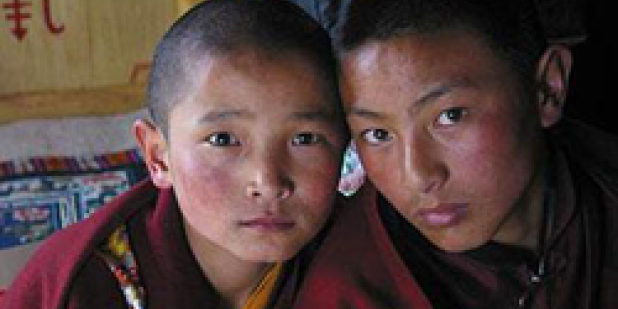Happy Lunar New Year from the USC US-China Institute!
The Holy Silent Stones
Part of the Soul-Searching in Tibet: Films by Pema Tseden (Wanma Caidan) series
Where

Pema Tseden (Wanma Caidan in Chinese). 2005. 102 min. 35 mm.
Part of the Soul-Searching in Tibet: Films by Pema Tseden (Wanma Caidan) series
A child monk in a monastery prepares to travel home to spend the Tibetan New Year with his family. The villagers are rehearsing their annual staging of a traditional Tibetan opera, but the little monk is more interested in the comic-religious drama series Journey to the West on television. When he returns to the monastery, he continues to watch the drama on television with the monastery's trulku (reincarnated lama), also a child, during their free time. The intricate and comedic balancing of study in the monastery with traditional opera in the village and Chinese drama on television brings to life the Tibetans' seamless interweaving of tradition and globalization. Speaking as the chair of the Jury at the Pusan International Film Festival, renowned Iranian filmmaker Abbas Kiarostami praised Pema Tseden's directorial debut and described it as in the tradition of Bresson and Ozu. Introduction by Professor Robert Barnett, Columbia University.
"The Silent Holy Stones has the immediacy of a documentary, delivering real insight into the evolution of a much-romanticized culture.."-Aaron Lazenby, San Francisco Film Festival 2006
Golden Rooster Awards—Best Directorial Debut
Shanghai International Film Festival—Asian New Talent Award
Changchun Film Festival—Special Jury Award
Co-presented with Columbia University—Modern Tibetan Studies, Trace Foundation, Maysles Institute, and Kham Film Project. Support for this program is provided, in part, by The Henry Luce Foundation, The Shelley & Donald Rubin Foundation, and Center on U.S.-China Relations.
NOTE: Registered tickets can be picked up starting at 4:00 pm on the day of event. Tickets not picked up by 6:35 pm will be forfeited.
Featured Articles
We note the passing of many prominent individuals who played some role in U.S.-China affairs, whether in politics, economics or in helping people in one place understand the other.
Events
Ying Zhu looks at new developments for Chinese and global streaming services.
David Zweig examines China's talent recruitment efforts, particularly towards those scientists and engineers who left China for further study. U.S. universities, labs and companies have long brought in talent from China. Are such people still welcome?






